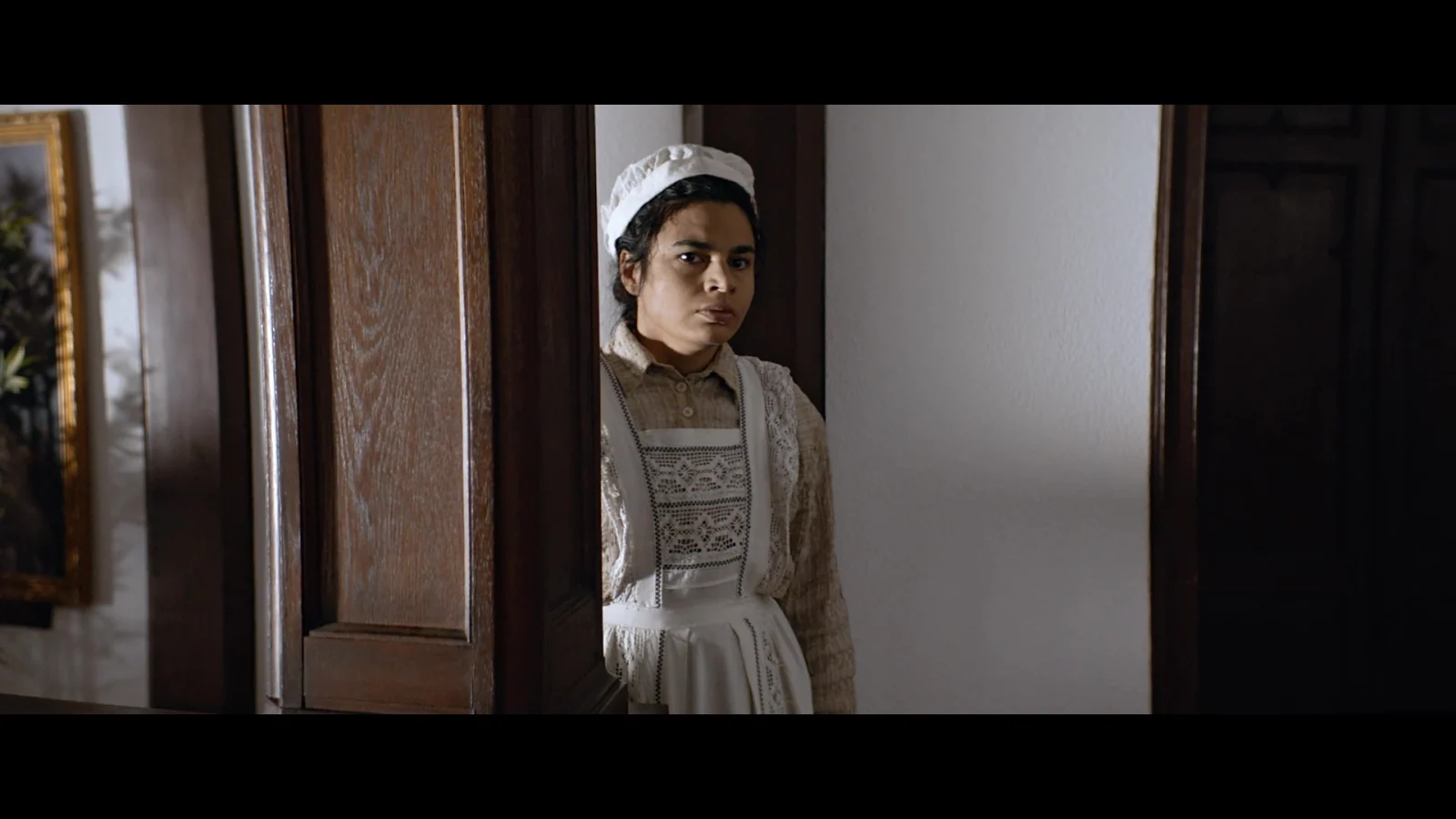
- This event has passed.
Remembering Roma Enslavement and Private Screening of "Letter of Forgiveness" by Alina Șerban

ARCS and our partners ARCHER-American Romanian Coalition for Human and Equal Rights invite you to virtually attend the special event "Remembering Roma Enslavement." The event is a recognition and celebration of 165 years of Roma Emancipation.
The event "Remembering Roma Enslavement" consists of two parts. In the first half hour Otilia Baraboi, Executive Director at American Romanian Cultural Society invites us to a private screening of "Letter of Forgiveness," a short movie directed by Alina Serban.
The short brings us back to 1855, when in the household of a wealthy Romanian noblewoman, a lavish dinner is being presented to important guests. As they arrive, Maria, a Roma-Gipsy slave, is making preparations and sees an opportunity to change her and her son Dinca's fates.
Maria and Dinca's story is true; they helped change the course of Romanian history, hastening the abolition of slavery.
In the second part of the event we welcome our guest speakers special guest speakers Dr. Margareta (Magda) Matache, Alina Serban, Dr. Marius Turda, and Adrian Nicolae Furtuna MA in Advanced Sociological Research (Guest speakers bios will be presented in Discussion).
The conversation is moderated by Mihaela Campion, clinical psychotherapist, and Creative visionary of ARCHER, and Andreea Mottram ARCHER co-founder.
The Roma had been enslaved for five centuries in Wallachia and Moldova. Their freedom came 165 years ago, but public recognition of their loss, suffering, and trauma remains patchy to this day. In this discussion about the enslavement of the Roma, we want to pay attention to victimhood, memory, and representation. In an attempt to commemorate this historical experience we also reflect on the recurrent anti-Roma racism in Romania and how it can be successfully resisted.

Alina Serban
Alina Șerban is an independent Roma artist – award-winning actress, playwright, director and activist. After acquiring a drama degree at the Academy of Theatrical Arts and Cinematography in Bucharest, Serban attended the Tisch School of the Arts in New York and The Royal Academy of Dramatic Art in London. Some of her most important artistic achievements are: pioneering Roma feminist political theatre in Romania and becoming the first Roma woman director to have a play included in the permanent repertoire of a state theatre in Romania. For her main role in Gipsy Queen, Alina Serban earned the Best Actress Award at the Actors Guild Awards in Germany in 2020. She also starred in Alone at My Wedding and she became the first Romanian Roma actress to participate at the Cannes International Film Festival. She won several international awards, including Best Actress. As far as her film work is concerned, she made her debut in filmmaking with the short Letter of Forgiveness, the first film project about the Roma slavery, directed by a Roma. The film received a Special Mention at Transilvania International Film Festival and it is now in the international festival circuit. She also took part in the artistic decision making process as a script consultant for three European film projects focusing on the experiences of Roma women.

Adrian-Nicolae Furtună
Adrian-Nicolae Furtună graduated from the Faculty of Sociology of the University of Bucharest and holds a Master's Degree in Advanced Sociological Research. He is currently enrolled as a Ph.D. student at the Quality of Life Research Institute, specializing in the field of the social memory of Roma slavery.
During the last 15 years, he has published several research papers and scientific articles on Roma slavery and Roma Holocaust in Romania, including The Roma in Romania and the Holocaust. History, theory, culture (published in 2018), Roma slavery in Wallachia. Fragments of social history. Sales of children/donations. Marriages. Requests for release (published in 2019). He also edited the book Deportation of Roma soldiers to Transnistria. Between administrative "mistakes" and biopolitical imperatives. Case studies and archive documents (published in 2020). In 2020 he also curated the exhibition “164 years since the abolition of Roma slavery - Oral maps from today” - a project of social memory.
He is currently the director of the Cultural and Social Research Center "Romane Rodimata" and holds the position of councilor in the Research and Documentation Department of the National Center for Roma Culture.

Andreea Mottram
I have been volunteering and working in human rights and social justice organizations and initiatives for the past 25 years. I have a strong professional and personal passion to advocate for the rights of vulnerable groups, such as people with disabilities, the elderly, the Roma population, and others. I am grateful to join ARCHER and its energetic group of visionary people committed to fight for social justice. I am ready to serve in this process of change.

Margareta (Magda) Matache
Margareta (Magda) Matache is a Roma rights activist and scholar from Romania, director of the Roma Program at Harvard FXB, and also a Harvard instructor. From 2005 to 2012, Margareta Matache was the Executive Director of Romani CRISS, a leading Roma rights organization that defends the rights of Roma. In 2012 she was awarded a Hauser postdoctoral fellowship at Harvard FXB where she founded the Roma Program. In Spring 2017 she co-edited Realizing Roma Rights, an investigation of anti-Roma racism, with the goal to set the foundations for a more inclusive Europe. Her other publications and research have ranged from the rights and agency of Romani children and adolescents to early childhood development, anti-Roma racism, reparations, segregation in education, and participatory action research.

Marius Turda
Marius Turda is Professor and Director of the Centre for Medical Humanities at Oxford Brookes University. He was the founding director of the Cantemir Institute at the University of Oxford (2012-13) and the founder of the Working Group in the History of Race and Eugenics (2006). His most recent books include Teleology and Modernity (2019); Religion, Evolution, and Heredity (2019); Historicizing Race (2018; Romanian translation 2019); The History of Eugenics in East-Central Europe, 1900-1944: Texts and Commentaries (2016); Eugenics and Nation in Early Twentieth-Century Hungary (2014); Latin Eugenics in Comparative Perspective, 1860-1940 (2014); Crafting Humans: From Genesis to Eugenics and beyond (2013). He is the General Editor of Bloomsbury’s A Cultural History of Race, to be published in 6 volumes (2020-), while his own forthcoming book Scientific Racism in Hungary will be published in 2021. Between 2018 and 2020, he also curated two exhibitions on anthropology, biopolitics, and eugenics in Romania, and was one of the main consultants for the acclaimed BBC documentary ‘Eugenics: Science’s Greatest Scandal’ (2019). He lives in London.

Mihaela Campion
MA, LCPC, CCDVC, Licensed Clinical Psychotherapist
I feel passionate about learning, implementing, and sharing about social justice and human rights. My belief system is founded upon the concept of collective striving for excellence through equal rights. As humans, we learn and grow in an environment that supports and encourages equality. This philosophy has been the main guiding principle for my family, my work, my friendships, and my citizenship. ARCHER is a dream come true.